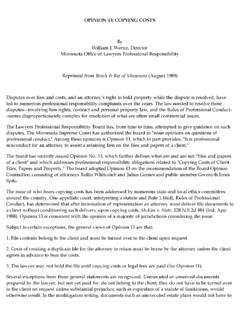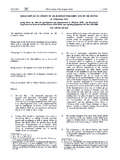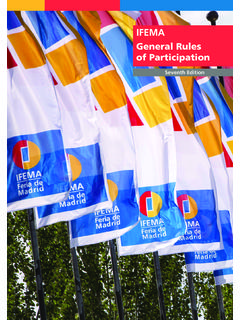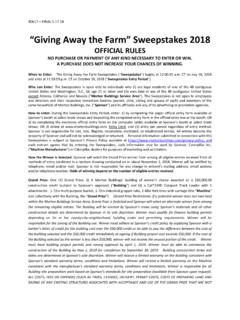Transcription of MINNESOTA RULES OF PROFESSIONAL CONDUCT
1 MINNESOTA RULES OF PROFESSIONAL CONDUCT Effective October 1, 2005, with amendments through June 11, 2015 On June 17, 2005, the MINNESOTA Supreme Court ordered that: 1) the amendments to the MINNESOTA RULES of PROFESSIONAL CONDUCT contained herein are prescribed and promulgated to be effective October 1, 2005. 2) the inclusion of comments is made for convenience and does not reflect court approval of the comments made therein. INDEX Preamble: A Lawyer s Responsibilities TRANSACTIONS WITH PERSONS OTHER Scope THAN CLIENTS Terminology Truthfulness in Statements to Others CLIENT-LAWYER RELATIONSHIP Communication With Person Competence Represented by Counsel Scope of Representation and Dealing With Unrepresented Person Allocation of Authority Between Respect for Rights of Third Persons Client and Lawyer LAW FIRM AND ASSOCIATIONS Diligence Responsibilities of a Partner or Communication Supervisory Lawyer Fees Responsibilities of a Subordinate Lawyer
2 Confidentiality of Information Responsibilities Regarding Nonlawyer Conflict of Interest: Current Clients Assistants Conflict of Interest: Current Clients: PROFESSIONAL Independence of a Lawyer Specific RULES Unauthorized Practice of Law; Duties to Former Clients Multijurisdictional Practice of Law Imputation of Conflicts of Interest: Restrictions on Right to Practice General Rule Responsibilities Regarding Law- Special Conflicts of Interest for Related Services Former and Current Government Employment of Disbarred, Suspended, Officers and Employees or Involuntarily Inactive Lawyers 2 Former Judge, Arbitrator, Mediator.
3 PUBLIC SERVICE or Other Third-Party Neutral Voluntary Pro Bono Publico Service Organization as Client Accepting Appointments Client with Diminished Capacity Membership in Legal Services Safekeeping Property Organization Declining or Terminating Law Reform Activities Affecting Client Representation Interests Sale of Law Practice Pro Bono Limited Legal Services Duties to Prospective Client Programs COUNSELOR INFORMATION ABOUT LEGAL SERVICES Advisor Communications Concerning a (deleted) Lawyer s Services Evaluation for Use by Third Persons Advertising Lawyer Serving as Third-Party Direct Contact with Prospective Clients Neutral Communication of Fields of Practice and ADVOCATE Certification Meritorious Claims and Firm Names and Letterheads Contentions Expediting Litigation MAINTAINING THE INTEGRITY OF THE Candor Toward the Tribunal PROFESSION Fairness to Opposing Party and Bar Admission and Disciplinary Matters Counsel Judicial and Legal Officials Impartiality and Decorum of the
4 Reporting PROFESSIONAL Misconduct Tribunal Misconduct Trial Publicity Disciplinary Authority; Choice of Law Lawyer as Witness Special Responsibilities of a Prosecutor Advocate in Nonadjudicative Proceedings 3 PREAMBLE: A LAWYER S RESPONSIBILITIES [1] A lawyer, as a member of the legal profession, is a representative of clients, an officer of the legal system and a public citizen having special responsibility for the quality of justice. [2] As a representative of clients, a lawyer performs various functions. As advisor, a lawyer provides a client with an informed understanding of the client s legal rights and obligations and explains their practical implications.
5 As advocate, a lawyer zealously asserts the client s position under the RULES of the adversary system. As negotiator, a lawyer seeks a result advantageous to the client but consistent with requirements of honest dealings with others. As evaluator, a lawyer examines a client s legal affairs and reports about them to the client or to others. [3] In addition to these representational functions, a lawyer may serve as a third-party neutral, a nonrepresentational role helping the parties to resolve a dispute or other matter. Some of these RULES apply directly to lawyers who are or have served as third-party neutrals.
6 See, , RULES and In addition, there are RULES that apply to lawyers who are not active in the practice of law or to practicing lawyers even when they are acting in a nonprofessional capacity. For example, a lawyer who commits fraud in the CONDUCT of a business is subject to discipline for engaging in CONDUCT involving dishonesty, fraud, deceit, or misrepresentation. See Rule [4] In all PROFESSIONAL functions a lawyer should be competent, prompt, and diligent. A lawyer should maintain communication with a client concerning the representation.
7 A lawyer should keep in confidence information relating to the representation of a client except so far as disclosure is required or permitted by the RULES of PROFESSIONAL CONDUCT or other law. [5] A lawyer s CONDUCT should conform to the requirements of the law, both in PROFESSIONAL service to clients and in the lawyer s business and personal affairs. A lawyer should use the law s procedures only for legitimate purposes and not to harass or intimidate others. A lawyer should demonstrate respect for the legal system and for those who serve it, including judges, other lawyers, and public officials.
8 While it is a lawyer s duty, when necessary, to challenge the rectitude of official action, it is also a lawyer s duty to uphold legal process. [6] As a public citizen, a lawyer should seek improvement of the law, access to the legal system, the administration of justice and the quality of service rendered by the legal profession. As a member of a learned profession, a lawyer should cultivate knowledge of the law beyond its use for clients, employ that knowledge in reform of 4 the law and work to strengthen legal education. In addition, a lawyer should further the public s understanding of and confidence in the rule of law and the justice system because legal institutions in a constitutional democracy depend on popular participation and support to maintain their authority.
9 A lawyer should be mindful of deficiencies in the administration of justice and of the fact that the poor, and sometimes persons who are not poor, cannot afford adequate legal assistance. Therefore, all lawyers should devote PROFESSIONAL time and resources and use civic influence to ensure equal access to our system of justice for all those who because of economic or social barriers cannot afford or secure adequate legal counsel. A lawyer should aid the legal profession in pursuing these objectives and should help the bar regulate itself in the public interest.
10 [7] Many of a lawyer s PROFESSIONAL responsibilities are prescribed in the RULES of PROFESSIONAL CONDUCT , as well as substantive and procedural law. However, a lawyer is also guided by personal conscience and the approbation of PROFESSIONAL peers. A lawyer should strive to attain the highest level of skill, to improve the law and the legal profession, and to exemplify the legal profession s ideals of public service. [8] A lawyer s responsibilities as a representative of clients, an officer of the legal system and a public citizen are usually harmonious.













